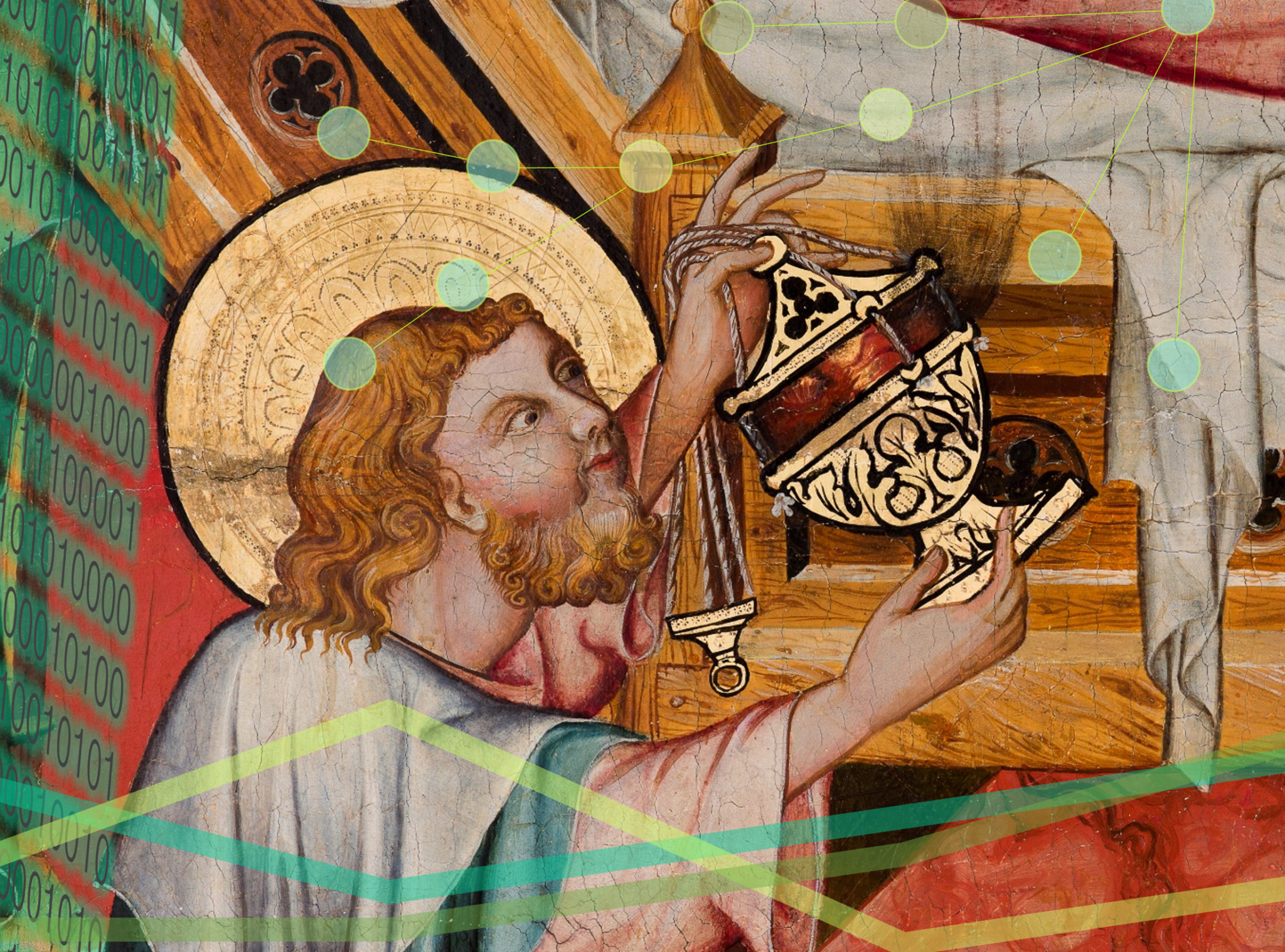
The disciplines involved in the study of the Middle Ages and the Early Modern Period developed an interest in the application of Digital Humanities (DH) methods at an early stage. They have contributed significantly to the formation of DH as a scientific discipline and can now build on a broad DH expertise and large and complex data treasures.
In recent years, many new questions and working methods for sources and objects from the Middle Ages and Early Modern Period have been added to this field – it’s time to present some of them in a lecture series: Students will learn how DH methods are applied and what possibilities they offer from a disciplinary or interdisciplinary perspective. They will also be shown how DH approaches are used to analyse different types of sources (images, literary and historical text sources, objects, historical maps, archaeological survey data, music, etc.).
The spectrum ranges from the use of artificial intelligence, natural language processing, distant viewing, DNA sequencing and network analysis to digital editing and annotation. Working with digital 3D models and GIS-based analyses as well as approaches from game studies and citizen sciences will also be a focus.
The lecture will take place every Monday from 5.15 pm to 6.45 pm from 2nd October 2023 in the Georg Eisler lecture theatre (E.003 U1.003) at UNIPARK (Erzabt-Klotz-Straße 1, 5020 Salzburg). The lectures will also be recorded and will be available on UniTV after editing.
You can also follow the lecture online via Microsoft Teams.
Here you will find a list of the lectures as well as all access links – each lecture has the same link! The recordings of the lectures already presented can be accessed on UniTV-The Salzburg University Television.
02.10. Introduction: Dazzling Data – Digital Humanities in Medieval and Early Modern Studies
Isabella Nicka (IMAREAL/IZMF, University of Salzburg), Katharina Zeppezauer-Wachauer (MHDBDB, University of Salzburg), Peter Färberböck (IMAREAL/IZMF, University of Salzburg)
09.10. Seven Things of Mary. Object Detection and art-historical Realienkunde
Peter Bell (Institute of Art History, University of Marburg)
16.10. Open Research Strategies. (Humanities) Research for and with the Public
Marlene Ernst (Salzburg City Archive)
23.10. Interoperability of Text and Image in the Digital Edition of the Wenceslas Bible
Linda Beutel-Thurow (Department of German Studies, University of Salzburg), Julia Hintersteiner (Department of German Studies, University of Salzburg)
30.10. HTR, TEI, DNA & NLP: Early Medieval Manuscripts, their Paratext and the Digital Humanities
Bernhard Bauer (Centre for Information Modelling, Graz)
06.11. Digital Transformation of Early Modern Memento Mori Literature: Challenges and Potentials
Claudia Resch (Austrian Academy of Sciences, ACDH-CH, Vienna)
13.11. Making Castles digitally accessible – Hohensalzburg digital and Inventaria Projects
Ingrid Matschinegg (IMAREAL/IZMF, University of Salzburg), Stefan Zedlacher (IMAREAL/IZMF, University of Salzburg), Walter Brandstätter (Department of History, University of Salzburg), Elisabeth Gruber-Tokić (Institute of Linguistics, University of Innsbruck), Elisabeth Tangerner (Department of History, University of Salzburg)
20.11. Transcription Database for the Codex Manesse (Great Heidelberg Song Manuscript, cpg 848)
Anna Kathrin Bleuler (Chair of German Language and Literature of the Middle Ages, University of Augsburg)
27.11. Distant Viewing. Analysing Representations of Material in medieval Painting with Digital Humanities and Computer Vision Methods
Isabella Nicka (IMAREAL/IZMF, University of Salzburg), Miriam Landkammer (IMAREAL/IZMF, University of Salzburg), Andreas Uhl (Department of Artificial Intelligence and Human Interfaces, University of Salzburg), Michael Linortner (Department of Artificial Intelligence and Human Interfaces, University of Salzburg)
04.12. Integrated GIS-based Analysis of Medieval and Early Modern Landscapes using Archaeological Prospection Data and Digitised Historical Maps
Roland Filzwieser (Vienna Institute for Archaeological Science, University of Vienna)
11.12. DH Application Examples from Medieval Musicology
Robert Klugseder (Austrian Academy of Sciences, ACDH-CH, Department of Musicology, Vienna)
08.01. Our Horses Gallop Digitally: DH in the Interdisciplinary Project on Knowledge Transfer in Medieval Equine Medicine “Meeting in the Body of the Horse”
Jasmine Dum-Tragut (Centre for Research on the Christian East, University of Salzburg), Marat Yavrumyan (Centre for Research on the Christian East, University of Salzburg)
15.01. Early Musical Prints and Borrowed Melodies
Andrea Lindmayr-Brandl (Department of Musicology, Salzburg), Carlo Bosi (Department of Musicology, Salzburg)
22.01. Telespiele, Mobile Games and Open World – Game Studies in the Digital Humanities
Aurelia Brandenburg (Confoederatio Ludens, Bern University of the Arts), Peter Färberböck (IMAREAL/IZMF, University of Salzburg)
29.01. Middle High German Term Database Reloaded
Katharina Zeppezauer-Wachauer (MHDBDB, University of Salzburg), Alan van Beek (MHDBDB, University of Salzburg)
Concept and Organisation: Isabella Nicka | Katharina Zeppezauer-Wachauer | Peter Färberböck
You can download the lecture programme including a short description as PDF here.

